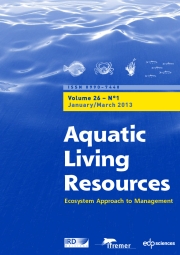Article contents
Modelling economic response to harvest and effort control in North Sea cod fishery
Published online by Cambridge University Press: 26 July 2008
Abstract
A number of European fishing fleets have been regulated through a combination of quota and effort (sea days) controls since 2004. These two regulation schemes are, however, interrelated, i.e. a given quota limit will necessarily determine the effort used and vice versa. A bioeconomic feedback model is presented which takes this causality between effort and harvest control into account, and switches back and forth between these two regulation schemes depending on which is the binding rule. The model is based on biological stock projection, and quotas are set using the Pope approximation while an economic production function is used to estimate the harvest when the effort is binding. The economic response of the fleet is modelled through a dynamic investment/disinvestment module which evaluates the change in the fleet capacity given the economic outcome of the fishery. A simple example is presented for the Danish seiners catching cod in the North Sea. The model has been constructed as part of the 6th framework project “Operational Evaluation Tools for Fisheries Management Options (EFIMAS)”.
Keywords
- Type
- Research Article
- Information
- Copyright
- © EDP Sciences, IFREMER, IRD, 2008
References
- 6
- Cited by


